
Rosalind Will Get Even More Marvelous
Regular readers are familiar with Rosalind bioinformatics learning platform, or check our earlier commentaries here and here. Nikolay Vyahhi, a creator of Rosalind, sent us an email update on where they are going next.
By the way, we’re slowing down with the current Rosalind engine
development to create a new collaborative platform for online education,
which will include all current features and more, also it’ll be scaled to
other disciplines (such as algorithms and coding for scientists). New
platform will be even more marvelous than Rosalind, so stay tuned :)
Nikolay wrote an introductory commentary for those unfamiliar with Rosalind. User stats are phenomenal for an web service that is only few months old.
-—————————————–
Rosalind - Nikolay Vyahhi
Rosalind is an online educational platform for learning bioinformatics. It was launched in August 2012 and so far subscribed over 4500 users. Rosalind allows learning bioinformatics concepts through problem solving and programing. In the end of last year the platform was named as Best educational site of 2012 by Homologus.
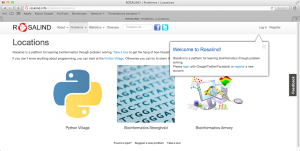
Rosalind problem tree is developed in a way that concurrently builds up biological, algorithmic, and programming knowledge. It is also possible to go deeper into one particular area: genome assembly, sequence alignment, computational proteomics, etc. Each attempt generates a new dataset and the system checks results automatically. There are no restrictions on using any particular programming language, so, basically, to join Rosalind only the Internet connection required.
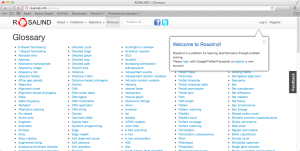
As of February 2013, the number of published problems reached 107 that have been attempted to be solved more than 77 thousand times.
In addition to tasks, Rosalind team has created a glossary that contains almost 500 terms, so every problem can be associated with one or several of them.
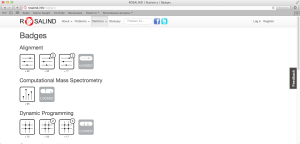
Rosalind has its own game mechanics with various levels and badges for users achievements that are constantly being expanded.
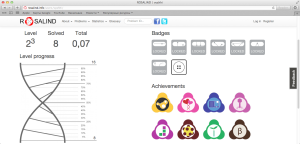
Rosalind is designed in a way that professors in bioinformatics can use it in their courses to create and manage classes, check assignments automatically and get class statistics. Rosalind also stores a list of people who teach bioinformatics and have links to online materials on their personal web pages.
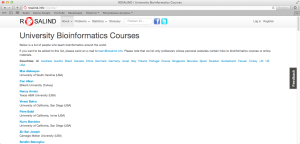
The opportunity to accept and oversee ideas proposed by users was added to actively involve bioinformatics community into the project. Experienced users may now take part in editing of ready-to-publish problems and suggest their own.
Rosalind is already receiving feedback from users from around the world. By the end of 2013 it is planned to create over 300 problems for more than 20000 active users.
Rosalind web page http://rosalind.info.